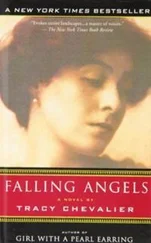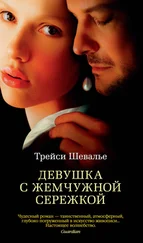Martha appeared with the nine-patch quilt in her arms, hesitating by the bed, her small face wary, as it always was around her mother. “It’s still damp from your sweat, Ma,” she said. “I been airing it but there hasn’t been enough sun today to dry it.”
“Give it to me!” Sadie snatched the quilt. Someone was calling out upstairs and Martha went to climb the ladder and see what they wanted.
James was less demonstrative, taking the mug Robert held out to him and managing a mild, “Thank you, son,” to contrast with Sadie. Robert watched while he gulped down the water, then took the mug from him, refilled it, and set it down on the floor within James’ reach. “You want anything else, Pa?”
“No. You fed the animals?”
“Yes, Pa.”
“How’s the corn? You brought any of it in yet?”
“Tomorrow. Mr. Day’s gonna help me now the hay’s in.”
“What are you doing today? You been working with Martha in the garden?”
“Yup. We’re gonna pickle cucumbers and stew tomatoes. Mrs. Day said she’d be along to help.”
“The Days are helping too much.”
Robert shrugged. There was nothing they could do about that: Nathan and Caleb and Sal were all sick too. One of them was going through the shakes now in the attic, rattling the floor above them. It was one of the ironies of swamp fever that it normally struck at the height of harvest when everyone was most needed. The crops were ready; the people weren’t, except for Robert, who had to be counted on to do the work of a grown man, though he was just nine. And Martha, unexpectedly: usually she was the first to go down with the fever and the last to get up again.
“You checked the apples?” James couldn’t help asking. He asked every day. “You sure they aren’t ready? Some of the spitters could be ready by now.”
“They don’t look ready, Pa.”
“Bring me one. No, bring me two. Bring me the reddest of the spitters and a Golden Pippin.”
Robert sighed, and James understood he was being a nuisance. His son would have to pull up some of the deer fence poles to get to one of the Golden Pippin trees. He knew the apples were not ripe, but he could not help fretting.
Sadie poked her face out from beneath the folds of the quilt. “Stop talkin’ ’bout those goddamn apples,” she growled. “If I wasn’t abed I’d chop down those trees!”
“Shut up. You’re even more of an idiot when you’re sick than when you’re drunk.”
Sadie kicked at her husband, but she was so weak that it did not have much effect. James inched himself to the edge of the bed, though he was still within kicking reach. Hearing the racket one of his children was making above him-the crack of teeth battering uncontrollably against each other-almost caused him to start shaking as well.
James and Sadie had not spent so much time together in months. Since returning from the camp meeting in May, she had avoided being alone with him, and kept quiet, throwing herself into cleaning the house, working in the garden, and even trying to clear a strip of land to plant with winter potatoes, something she had nagged James to do for years. James had watched her go at the trees-mostly elm and ash and oak-with an axe, chopping them down and cutting up the trunks and branches to stack and dry out for firewood. She had managed that much on her own. But the stumps defeated her. She hacked and dug at one, pulling off pieces of wood and making what was left even harder to get a hold on, until she collapsed and lay on her back next to the stump, sweating and swearing. James said nothing. Still bruised from her behavior at the camp meeting, he offered no help or advice. Sadie left the rest of the stumps, now an ugly strip alongside the garden covered with creepers and brambles.
Her new activeness coincided with a new sobriety as well, for the applejack had run out. She could only drink cider, and it was hard to get drunk on that. When she came to bed at night-the only time they were alone together-he no longer reached for her. They slept side by side, as far apart as possible, chaste as children.
Swamp fever brought back the meanness in her, though it left her too weak to act, so she had to resort to speech. James had to listen to endless complaints, accompanied by a torrent of swearing, and strange talk and sounds when the fever spiked each day in the late afternoon. Most of it made no sense, but she often spilled out names: of their children, of John Chapman, of family back in Connecticut. Never of him, though. Never James. He was not sure if he wanted her to say his name, for other names were often accompanied by mutterings and curses, and he did not want to hear what she thought of him in her delirium. He already knew anyway.
While he waited for Robert to bring him the apples, he lay as still as he could and studied the planks of the ceiling above him, with its distinctive oak grain festooned with cobwebs-a familiar sight from yearly bouts of fever. When James had built the cabin nine years before he’d used pine logs for the walls and oak he’d had planked in Perrysburg for the floors and ceilings. His father had used oak back in Connecticut, and James liked the familiarity of its whorls and knots and dense grain. Later he discovered he would have been better off using maple for the floors as it was lighter and more flexible. Only the English used oak for building, and James was made fun of for it. “English Goodenough,” he was called for a time by neighbors, a nickname taken up by Sadie, though she’d added to it, calling him “English Ain’t Goodenough.” Now, though, he was glad to have the close oak grain above him.
He closed his eyes for a moment, and then Robert was back, holding out a small yellow and brown Golden Pippin and a red and green spitter-more green than red. James took the apples and bit into the spitter. “Not ready.” He handed it back to Robert. “Give it to the pig.”
The Golden Pippin was clearly not ripe either, or it would have been yellower. James bit into it anyway. It was still sour. They would need another week, probably two, before they could be picked. By then he would be well enough to oversee their harvest.
James lay back and let the apple drop onto the bed. Sadie promptly kicked it, and it thudded into a corner. Then she began throwing herself back and forth and calling out-though it was still morning and she didn’t usually have a high fever then. She started to moan and rant, and James heard her cry out “Charlie!” and make unmistakable rutting sounds and moves. After it became clear what she was doing, he blocked his ears with his pillow.

I punished him with his brother Charlie. I didnt have no fever, I jest wanted to tug his chain. I seen him watchin me try to clear that tater patch full of stumps, not liftin a hand or gettin Caleb or Nathan to help me or even jest tell me what I was doin wrong.
I so badly wanted to make things better. Everyone was silent with me after the camp meeting. Wouldnt meet my eye or ask me how I did or fill my plate without askin. Not even Sal, who I could usually count on for the little things that showed she respected her Ma. It was like I had a disease and everybody took a step back from me.
I cleaned that cabin better than Id ever done before, scrubbed and swept every speck of dirt, brought down every cobweb, washed away the mold, aired everything that could be aired then aired it again. Washed all the clothes to get out the mud, scrubbed all the boots ready for winter. I weeded every inch of that garden, picked slugs off the lettuce, shooed away the birds and rabbits. Boiled the jars ready for puttin up the vegetables, and put up the beans soon as they was ready.
Читать дальше
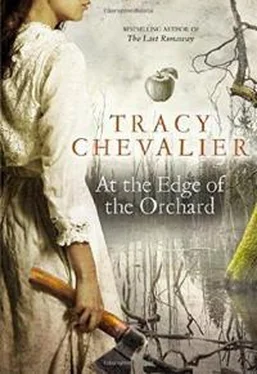


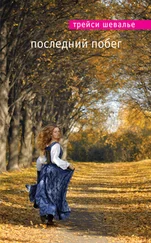



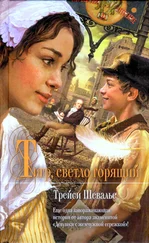
![Трейси Шевалье - Тонкая нить [Литрес]](/books/386177/trejsi-shevale-tonkaya-nit-litres-thumb.webp)

